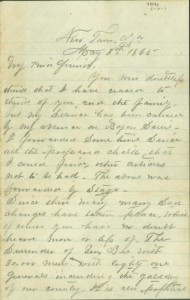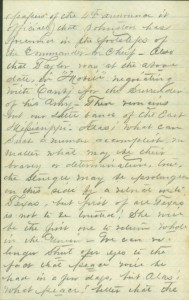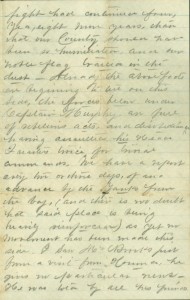History of States
When the representatives from the thirteen states met at the Constitutional Convention in 1787, they faced a big question: who has more control- the individual states or the federal government?
Some of the delegates (state’s right supporters) said that the states should have the right to decide if they are willing to accept certain federal acts. Other delegates (supporters of a strong central government) said, “No, the states cannot pick and choose.” If the Constitution was ever going to be ratified, a compromise had to be reached. With that, we have the Tenth Amendment which provides that powers not granted to the federal government by the Constitution, nor prohibited by the Constitution to the States, are reserved to the States or to the people.
Throughout the first half of the 19th century, Southern politicians defended and protected slavery by keeping control of the federal government. As new states were added to the United States, a series of compromises were arrived to maintain an equal number of “free” and “slave” states.
But between 1820 and 1859 the balance tipped to favor free states. The widening gap between slave and free states reflected the changes occurring in each region. The South was devoted to a plantation economy and had a slowly growing population. But the North has become industrialized, its cities were thriving and huge numbers of European immigrants were settling in the North to work in the factories.
Why did that matter? This boost in Northern population meant the future addition of more free states and possibly the election of a Northern, most likely anti-slavery, president. As the South recognized that control of the government was slipping away, it turned to a states’ right argument to protect slavery.
Southerners claimed that the federal government was prohibited by the Tenth Amendment (states’ rights) from taking away the right of slaveholders to take their “property” into a new territory.
They also stated that the federal government was not permitted to interfere with slavery in those states where it already existed.
Between states’ rights and the act of secession, Southerners felt their way of life would be protected.
The issue started with the 10th Amendment.
“The powers not delegated to the United States by the Constitution, nor prohibited by it to the states, are reserved to the states respectively, or to the people.”
1798 | Alien and Sedition Act were passed by John Adams when the new United States was about to go to war with France. People wanted to deport or imprison “aliens” (French people) because they may be spies. The Acts increased the residency requirement for American citizenship from five to thirteen years, authorized the president to imprison or deport aliens considered dangerous to the peace and safety, and restricted speech critical of the government. |
1798-1799 | Kentucky and Virginia Resolutions were written by Thomas Jefferson and James Madison. The resolutions argured that the federal government had no authority to exercise power not specifically delegated to it in the Constitution. It argued that state governments had the power to override federal laws that exceeded constitutional authority. This became the doctrine of nullification. |
1807 | Jefferson administration bought Louisiana from France even though the Constitution gave Congress no explicit power to acquire new territory. |
1807 | Jefferson administration imposed an embargo forbidding American ships to leave American ports. The Constitution allowed Congress only to regulate interstate and foreign commerce. not to prohibit it. |
1832 | The nullification crisis involved a confrontation between South Carolina and the federal government. Tariffs imposed to promote American manufacturing weakened South Carolina’s economics. The state declared that the tariffs were unconstitutional and unenforceable. Congress passed a bill to allow military forces against South Carolina and a new negotiated tariff, which satisfied the state- but kept the state vs federal rights issues controversial. |
1860 | South Carolina was the first state to secede from the United States. With two months, eleven states left the Union because they believed that they had voluntarily joined the union and they could also leave it. |
QUESTION: After reviewing the above actions, what issues were challenged by the federal or state government?

UNION | CONFEDERACY |
| Federal rights meant the government wanted more power over the states so they could have certain rules everyone has to follow. | State rights meant the state wanted more power than the government so they could do things the way they wanted them done. |
| Northern states had the majority of industrialization/factories. | The South would argue that the Constitution is an agreement between states, not between people. It was the states that created the national government and gave it what power it had. States’ Rights supporters believe that the state is closest to the citizens and understands their wishes better. |
| The people of the northern states did not agree that the protection of slavery was a right guaranteed under the States’ Rights amendment to the Constitution. | The slave states, struggling to maintain their economy, their slaves, and their life style, found no support through the provisions of the Federal Government/U.S. Constitution. Proslavery states used states’ rights doctrines to justify their secession from the United States. |
QUESTION: Brainstorm programs, laws, events seen in our country today. Who controls them – federal or state?
This transcription was copied from the original document and is representative of all spelling, punctuation, and grammar as written by the creator. The original document is housed in the Pearce Civil War Collection, Pearce Collections Museum, Navarro College, Corsicana, Texas. https://www.PearceMuseum.com
New Town, La. May 8th, 1865
My kind friend,
You will doubely think that I have ceased to think of you and the family, but my Silence has been caused by my absence on Bayou Sauie– I forwarded Some time Since all the “prepared chalk” that I could find, other articles not to be had. The above was forwarded by Stage.
Since then many many Sad changes have takin place, which of course you have no doubt heard more less of. The Surrender of Gen. Lee with 30,000 men & with eighty one generals including the gallaxy of our country. It is also possitive (papers of the 4th announce it officially) that Johnston has followed in the footsteps of the Commander-in-Chief- Also that Taylor was at the above date, in “Mobile” negoiating with “Canby” for the Surrender of his Army-There remains but our Little band of the East Mississipipi- Alas; what can Such a number accomplish, no matter what may be their bravery or determination, true the Strugle may be prolonged on this side by a retreat into Texas, but first of all Texas is not to be trusted: She will be the first one to return whole in the Union- We can no longer Shut our eyes to the fact that peace will be had in a few days, but Alas: What a peace! better that the fight had continued four, yea, eight more years, than that our Country should have been so humiliated, and our noble flag trailed in the dust-Already the above facts are begining to tell on this Side, the forces below under Captain Murphy are full of rebelious acts, and disobedience having assaulted his Head Quarters twice for trivial commands. We have a report every two or three days, of an advance by the Yanks from the bay. (and there is no doubt that said place is being heavily reinforced) as yet no movement has been made this side. I Saw Mr Brooks first from a visit from Houma. he gives no particular news- He was told by all his friends not to come back as peace would be concluded before 30 days-I have not heard from Lafourche since my return. I have got entirely well of my last expeditions, at one time I was quite uneasy-I was to have gone this week in the lines with Capt Whitaker, but after such news I think we would meet with poor success in the way of bringing out recruits – as yet I am not decided whether I shall go in Assumption or Terrebonne – Have you heard from A___y- lately? I have not for two months, I hear that Louis Keen has amoie with you, is it so? I presume you have seen Col Righton & heard all the news from him-write me soon, your sincere friend
My Love to all
Tom [arrow to his name, print noting – Lt. Tom Grisham Col. Barron’s Cav. Unit]

“Civil War Letter” by Lt. Tom Grisham Col. Barron’s Cav. Unit (Pg. 1)

“Civil War Letter” by Lt. Tom Grisham Col. Barron’s Cav. Unit (Pg. 2)

“Civil War Letter” by Lt. Tom Grisham Col. Barron’s Cav. Unit (Pg. 3)

“Civil War Letter” by Lt. Tom Grisham Col. Barron’s Cav. Unit (Pg. 4)

